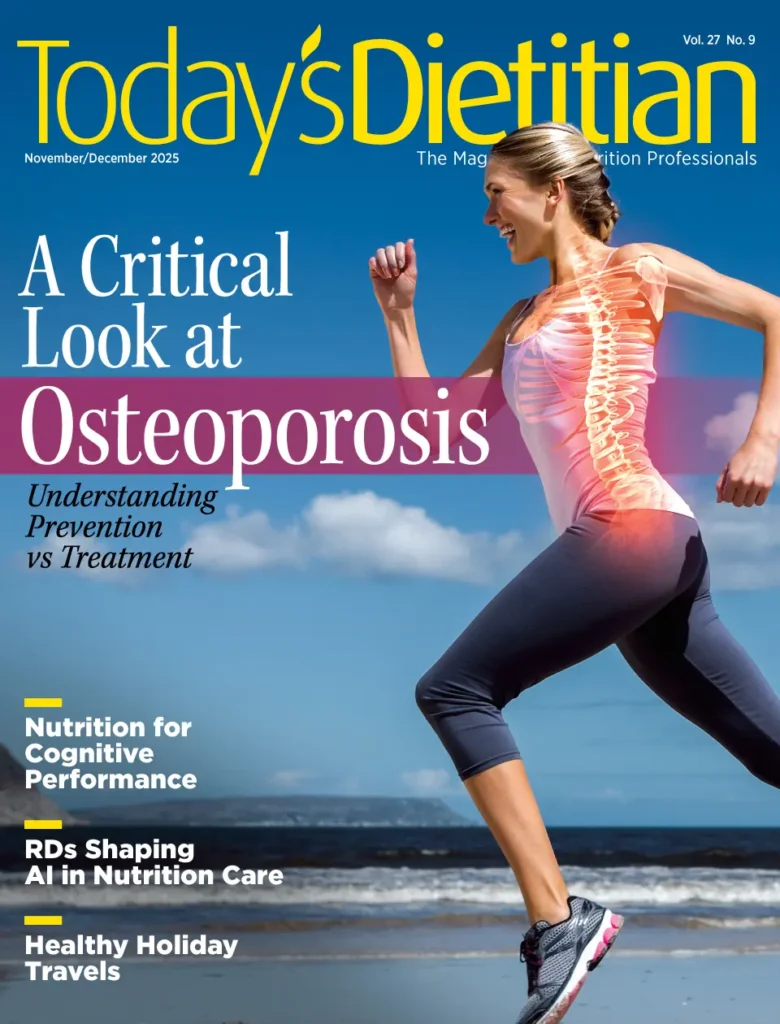Question:
Can you provide a review of acid/alkaline diets to help dietitians best respond to clients’ inquiries using science-based knowledge? Our clients read books offered by the alternative community that discuss these diets, and I believe as RDs, it is our duty to provide them with simple direction based on current scientific evidence.
Jan Howard, MS, RD, CD
Milwaukee, Wis.
Response:
There’s been a lot of buzz in the wellness world about “acidic” and “alkaline” diets. The theory goes something like this: A diet high in acid-producing foods leads to metabolic imbalance, promoting mineral loss and illness as the body tries to restore equilibrium. The antidote? Achieve improved health and balance by eating a more alkaline diet.
Large, well-designed clinical trials on the effectiveness of the alkaline diet for general health are lacking. However, the literature abounds with information about food’s effect on mineral balance as it relates to pH.
While some folks claim that foods can change the body’s pH, the fact is that cell and blood pH must stay tightly controlled (at about 7.4) to sustain life. However, the pH of urine does vary and predictably so. An article published in The Journal of the American Dietetic Association used a calculation model to indicate the extent to which different foods affect urine acidity. These assigned values have been used to quantify the acid- or base-forming potential of foods. In general, meat, poultry, fish, dairy products, caffeine, sugar, and salt are the most acid forming, while fruits and vegetables are the most alkaline forming (mainly due to protein and mineral content). Grains are slightly acid forming, and legumes vary by type.
Why is this important? Studies suggest that when we indulge in an excess of acid-forming foods, the body works harder to neutralize the pH, mainly by releasing alkalizing minerals into the blood to buffer the acid. When the diet is low in these critical minerals, they must instead come from their biggest storage depot: bone. This is why there are so many studies on acid/base balance, calcium balance, and bone health. And a recurring theme is that, indeed, alkaline-forming foods (fruits and vegetables especially) have a positive effect on bone retention and that dietary acid load from Western diets may be a risk factor for osteoporosis. Other studies have found a positive effect of alkaline diets on muscle retention as people age. (In other words, a high intake of fruits and vegetables helps seniors retain their muscle mass.)
Another point of clarification: Some people claim that protein is “bad” because high-protein foods tend to be the most acid forming. However, studies have suggested that protein is not necessarily a major contributor to acid load; it can be readily compensated by an additional alkali load, and it turns out that protein helps the body excrete acid. More important is the type of protein. Plant proteins appear to be more protective than animal proteins, which contain more sulfur, which in turn contributes to acid load.
The alkaline diet, whose prescribed ratio is 80% alkaline-forming foods and 20% acid-forming foods, is said to reduce inflammation and increase resistance against disease. Bodily processes, say advocates, function at their best with this balance. And while there is some biochemical as well as anecdotal evidence to support these claims, it is a complex concept that is difficult to measure. Again, no clinical trials have established such correlations.
Bottom line? It’s certainly not a bad idea to recommend shifting the diet to include more fruits and vegetables. With the myriad of health advantages offered by a diet rich in fruits and vegetables, the biochemical explanation for these benefits might become a moot point.
— Dina Aronson, MS, RD, owns Welltech Solutions, a nutrition and technology consulting company.
For further reading:
Tucker K, Hannan MT, Kiel DP. The acid-base hypothesis: Diet and bone in the Framingham Osteoporosis Study. Eur J Nutr. 2001;40(5):231–237.
Ceglia S, Harris SS, Abrams SA, et al. Potassium bicarbonate attenuates the urinary nitrogen excretion that accompanies an increase in dietary protein and may promote calcium absorption. J Clin Endocrinol Metab. 2009;94(2):645–653.
Lanham-New S. The balance of bone health: Tipping the scales in favor of
potassium-rich, bicarbonate-rich foods. J Nutr. 2008;138(1):172S–177S.
Dawson-Hughes B, Harris SS, Ceglia L. Alkaline diets favor lean tissue mass in older adults. Am J Clin Nutr. 2008;87(3):662–665.
Remer T, Manz F. Potential renal acid load of foods and its influence on urine
pH. J Am Diet Assoc. 1995;95(7):791-797.
Remer T. Influence of nutrition on acid-base balance – metabolic aspects.
Eur J Nutr. 2001;40(5):214-220.
Sellmeyer DE, Stone KL, Sebastian A, Cummins SR. A high ratio of dietary animal to vegetable protein increases the rate of bone loss and the risk of fracture in postmenopausal women. Am J Clin Nutr. 2001;73(1):118-122.


